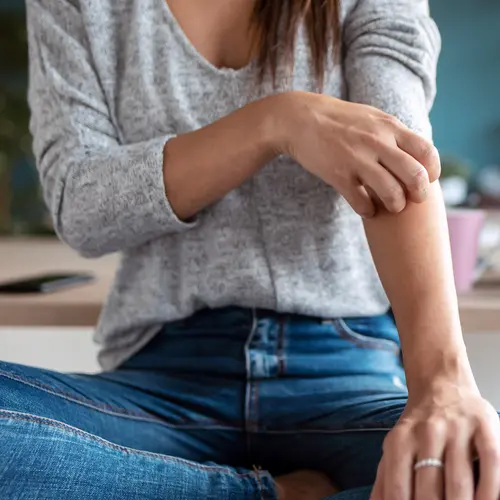Psoriasis is a skin condition that causes skin cells to build up faster than normal. This extra skin causes red, raised, scaly patches that can itch and burn. It has no cure, but there are treatments to help ease flare-ups -- ranging from topical creams and light therapy to drugs you take by mouth or IV.
You may have heard that antibiotics might be one treatment option, but is it?
Why Antibiotics?
Guttate is a type of psoriasis. It's the most common type after plaque psoriasis. It often starts in children or young adults and usually appears as small, red, teardrop-shaped spots on your arms, legs, and torso.
Bacterial infections like strep throat can trigger it. In most cases where they do, the psoriasis flares usually come about 3-4 weeks after the infection happens. Doctors usually prescribe antibiotics like penicillin or erythromycin (Erythrocin) to treat strep infections and ease symptoms.
Since these infections play a role in guttate psoriasis, a few small studies have researched whether antibiotics can help not only the infections, but the symptoms of psoriasis, as well.
So far, research has found that people who took antibiotics for their psoriasis had little or no improvement in their flare-ups.
Still, some doctors prescribe antibiotics as part of guttate psoriasis treatment, including:
- Amoxicillin (Moxatag)
- Azithromycin (Zithromax)
- Cephalexin (Keflex)
- Erythromycin
- Penicillin
- Rifampin (Rifadin)
This usually happens because the doctor believes that the psoriasis flare is an allergic reaction to the antibiotic used to treat the bacterial infection, instead of an actual case of psoriasis.
If you still have your tonsils, your doctor may recommend getting them removed as another way to deal with the flare. In this case, the doctor thinks that tonsillitis is the cause of the strep that caused the psoriasis flare.
Proven Treatment Options
Once someone finds out that they have psoriasis, finding a treatment option that works can take time and some trial and error.
There are three main types of treatments:
Topical treatments. These are creams and ointments that you put on your skin to ease inflammation and itching. You can get them over-the-counter or by prescription. The most common are corticosteroids. But your doctor might also suggest topicals that include:
- Anthralin
- Coal tar
- Retinoids
- Salicylic acid
- Synthetic vitamin D
Moisturizers also may help.
Light therapy. Also called phototherapy, this treatment puts your skin under natural or artificial sunlight. There are different types, but most involve exposing skin to ultraviolet light on a regular basis, typically under a doctor’s care.
Medication. Your doctor may prescribe drugs to take by mouth or ones you get by injection. These include biologics, which affect your immune system. Biologics you may use include:
TNF alpha inhibitors
- Adalimumab (Humira)
- Certolizumab pegol (Cimzia)
- Etanercept (Enbrel)
- Infliximab (Remicade)
TYK2 inhibitor
IL-23 inhibitors
IL-17 inhibitors
IL-12 and IL-17 inhibitor
You may also take other drugs like:
- Cyclosporine (Sandimmune)
- Methotrexate
- Retinoids
Talk with your doctor to find out which treatment is right for you.

